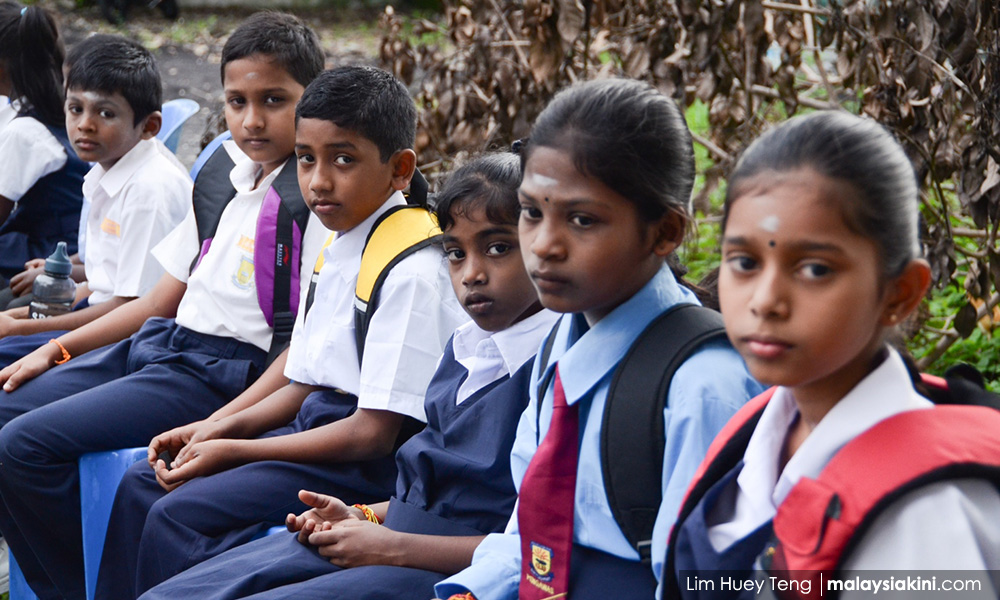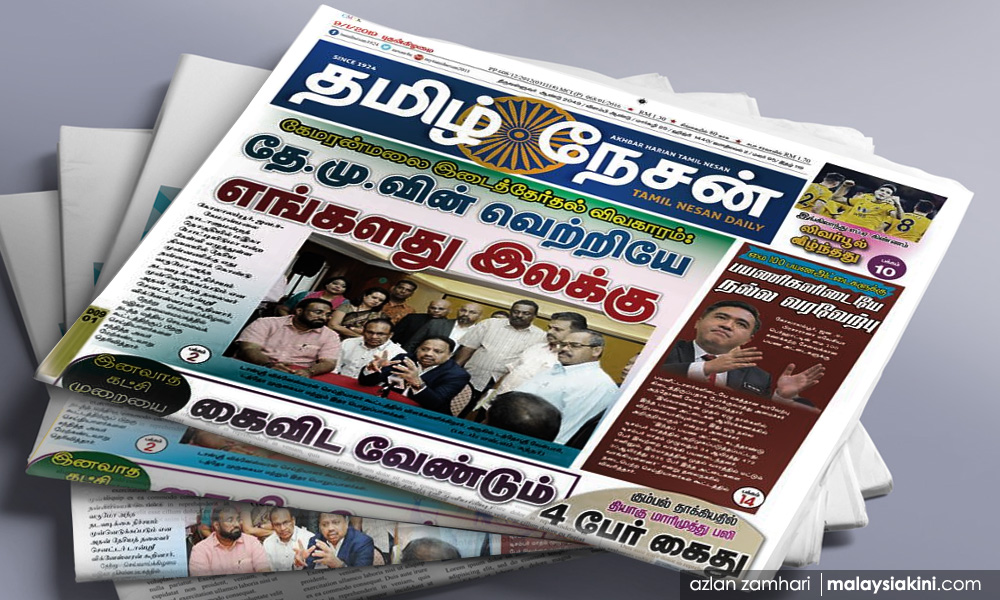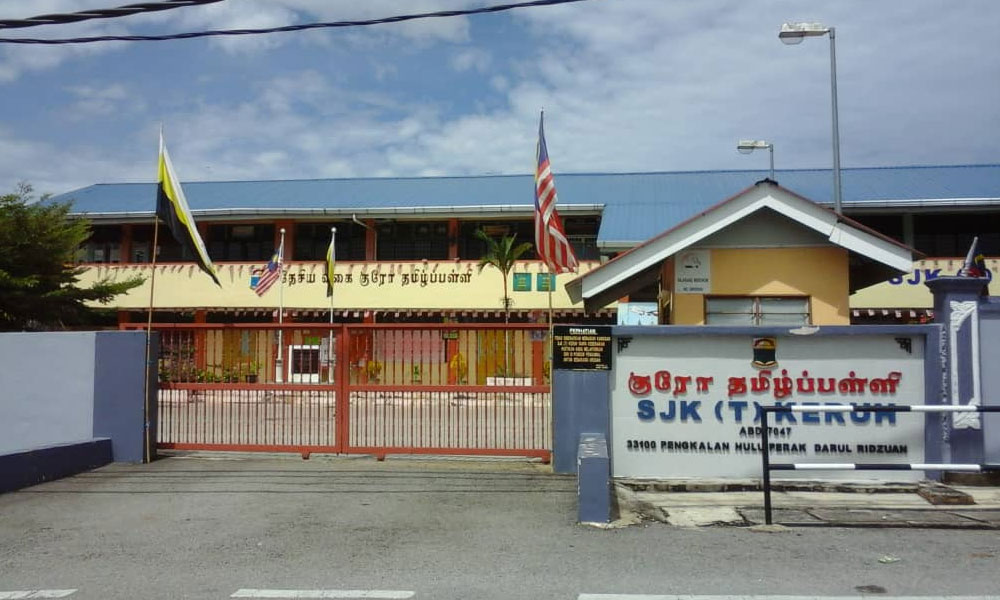
It is a sad thing to contemplate that many Tamils don’t know how to read and write Tamil. I have come across many "coconuts". The term "coconut" refers to a Tamil who does not speak Tamil but English with a Western accent.
The story of my late grandfather Renu who worked as a mandor at the Sungai Merbau Estate in Tanjong Malim relates to the thousands of Indians brought in by the British in the late 1800s as indentured labourers to work in the various plantations across British Malaya - mainly at sugarcane plantations until rubber took over.
Similarly, thousands of ethnic Chinese labourers were shipped in by the British to work in the tin mines. The colonial period was when the British were developing the economy of the states in British Malaya. They needed labourers to work in the rubber plantations and also to build roads and railway tracks.
Most of the Indian labourers were Tamil-speaking South Indians who brought along their language and culture with them. They contributed immensely to the development of Malaya in her various sectors.
The love for their mother tongue over the years kept their culture and language alive. But it is disappointing to note that the younger Tamil generation is not interested in learning their mother tongue.

As such, over the years, several Tamil dailies like Tamil Nesan, Tamil Osai, Thinathanthi and Nam Naadu Thinamurasu have ceased operations. It doesn't help when Indians only make up 2.1 million of our nation’s population of 32.4 million.
Over 950,000 Indians, mostly Tamils, were displaced from the estates in the 1970s and 80s due to re-development and the changing of land ownership. This resulted in a huge increase in urban Indian squatters without any social safety net.
There were few Tamil schools in the urban areas. The estates they had called home for decades were no more.
The Tamils had been insulated within their own communities. When they were moved out from the estates, they not only lost their homes, they lost their Tamil schools too.
Now we see renewed hope in the Pakatan Harapan government which says it recognises Tamil as an important language and is committed to improving it.
The establishment of the Tamil Language Standardisation Council- the first in Malaysia - shows the commitment of the government towards improving Tamil literature and developing Tamil language education.
Hence, we urge the Education Ministry to show greater transparency by appointing a Tamil scholar to lead this council instead of Deputy Education Minister Teo Nie Ching.

As we know, the Tamil Language Standardisation Council is placed under Dewan Bahasa and Pustaka (DBP) which is a government statutory body.
The DBP must adopt an inclusive approach to empower and widen the usage of the Tamil language (both spoken and written). As for the council, it must give emphasis to the learning of the Tamil language.
I strongly urge the council to not wait and wait for government funding. Pull up your socks, you can start to conduct free Tamil classes for all Malaysians keen to learn the language. Why don't you conduct free online Tamil classes?
The values of Tamil culture can only be inherited through the learning of the Tamil language. The recognition by the Education Ministry could inspire and boost the community to empower a Tamil reading culture.
Malaysia with its sizeable Tamil community hopes that mother-tongue education is implemented effectively and of quality. The use of Tamil is preserved through Tamil vernacular education via the 524 national-type primary Tamil schools (SJKT) throughout the country.
Unfortunately, there is not even a single secondary Tamil school in Malaysia. When there are so many primary Tamil schools, why is so difficult to establish a secondary Tamil school? Do we need a law that provides for a secondary Tamil school?
A total of 479 candidates sat for the Tamil language paper in the SPM examination last year. For STPM examination, a total of 686 candidates sat for the Tamil language paper.

Tamil school education in Malaysia has completed 203 years of existence. It is reported that the first Tamil class was held in 1816 at the Penang Free School taught by teachers from Tamil Nadu, India. Today, Tamil school education is based on a Malaysian syllabus with most of the teachers graduates.
The Tamil Language Standardisation Council comprises of Tamil language experts from the Education Ministry, the Examinations Syndicate and those from various NGOs. The council has two main committees - management and operation - with 37 members, all Indians.
They will be involved in creating new vocabularies, translating books, reading materials, documents besides enhancing grammatical skills.
Apart from the above, the council should also provide free language-based courses for those who are keen to learn the Tamil language, be a resource centre at the forefront and deal with a wide range of proficiency levels, student interests and content areas.

We want the council to write textbooks for Tamil secondary schools. It should provide opportunities for students to improve their talent and flair for writing.
Not to forget, Tamil writers must also be recognised for their lifetime achievements and it is the duty of the council to honour Tamil scholars, writers, poets and journalists who have dedicated their lives to the advancement of the Tamil language.
The council can organise a Tamil Literary Awards event as part of the council’s effort to recognise the Tamil language.
M VIVEK served as an aide to several former MIC deputy ministers. - Mkini


No comments:
Post a Comment
Note: Only a member of this blog may post a comment.